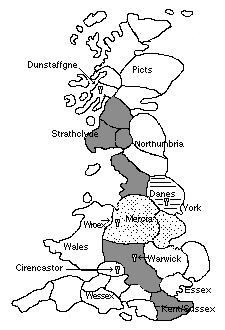 Bretwalda
Bretwalda Bretwalda
Bretwaldaby Mike Demana (article originally appeared in The Herald #24)
As Autumn of 816 A.D. arrived, many of the towns of Britain were shuddering to the hammering of invaders besieging their walls, or breaching them with torch and sword. September alone heard the cries of three towns taken by storm -- Northumbrian York, Mercian Warwick and Cirencastor. Two new strongholds were ringed by steel -- the Mercian border town of Wroexter and Dal Riatan Dunstaffgne.
In the campaign, the kingdom controlling a province's capital at the start of October receives its income (the harvest). Thus, a common September sight in the area of besieged towns was dust clouds of marching armies.
 The Saxon
axe that was poised to fall upon Mercia all Spring and Summer bit deeply
in September. Losing Cirencastor to Wessex and Warwick to Kent/Sussex, cost
Mercia the provinces of Hwicce and Chiltern. Now, the southern half of Mercia
had fallen to the Saxon coalition, leaving only two of its original five
provinces. Mercia's invasion of Essex was retreating also. A large Essex
army chased it to the border. The Wessex siege of Wroexter, on the Welsh
border, tightened the noose on King Coenwulf's kingdom more. Winter would
be a grim one.
The Saxon
axe that was poised to fall upon Mercia all Spring and Summer bit deeply
in September. Losing Cirencastor to Wessex and Warwick to Kent/Sussex, cost
Mercia the provinces of Hwicce and Chiltern. Now, the southern half of Mercia
had fallen to the Saxon coalition, leaving only two of its original five
provinces. Mercia's invasion of Essex was retreating also. A large Essex
army chased it to the border. The Wessex siege of Wroexter, on the Welsh
border, tightened the noose on King Coenwulf's kingdom more. Winter would
be a grim one.
Autumn brought both joy and sadness to Mercia's northern neighbors, the Angles of Northumbria. Eorl Mundar's command broke the siege of the Strathclyde army around Carlisle, saving the province of Rheged. The Britons were forced to be content with only Dumfries to show for this year's successes. Waves of shock rippled through the kingdom with the news of the fall of York, though. King Eanred had counted on the Roman walls of northern Britain's greatest city to hold out at least several months more. Whether it was Viking ferocity or fear of their rumored atrocities that caused its early fall, a pall of smoke hung over the city for a week afterwards.
In the north, an ancient kingdom stomped the last, green shoots of a younger one. The Picts routed the depleted Scot army that had marched out to defend their capital. Two months later, Dunstaffgne surrendered. The last of the Dal Riatan immigrants from Hibernia now paid homage to the tattooed, Pictish King Circinn. Their own king, Fergus MacErc, fled hunted to the Hebrides.